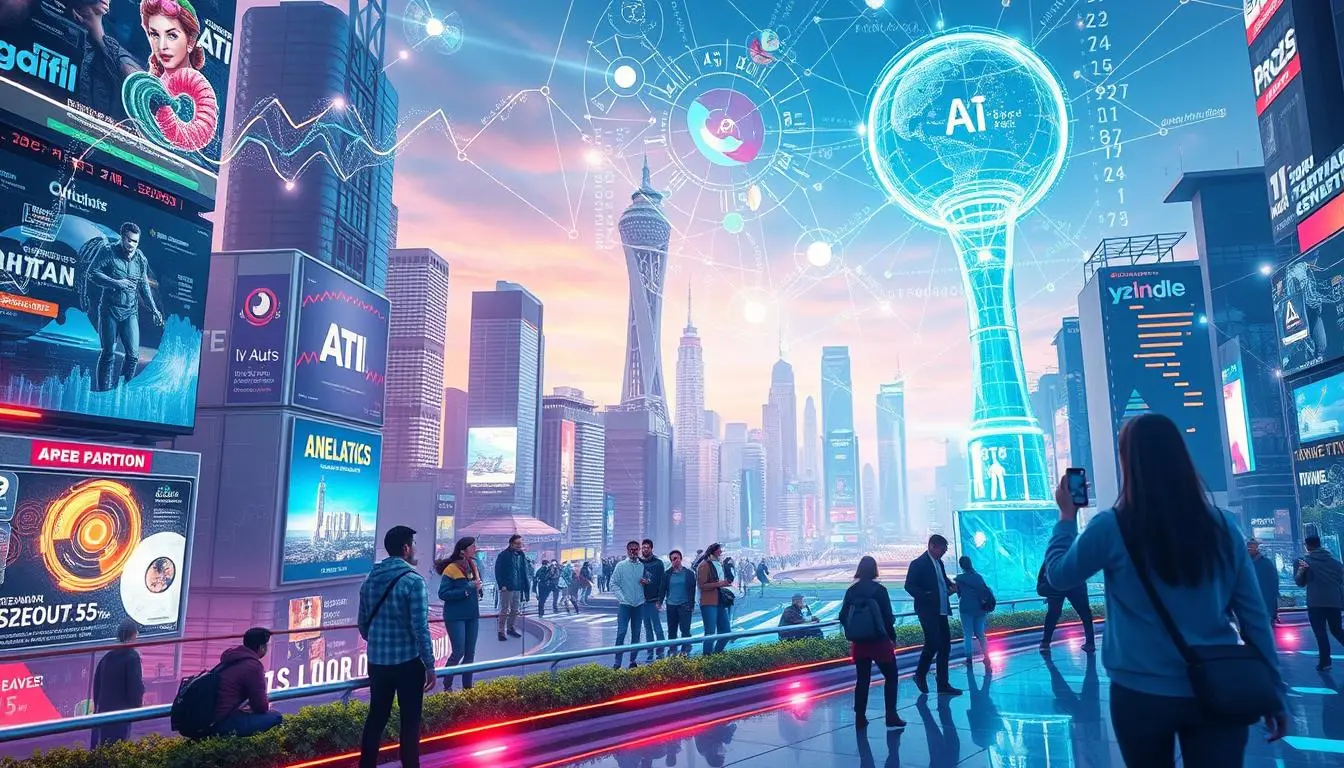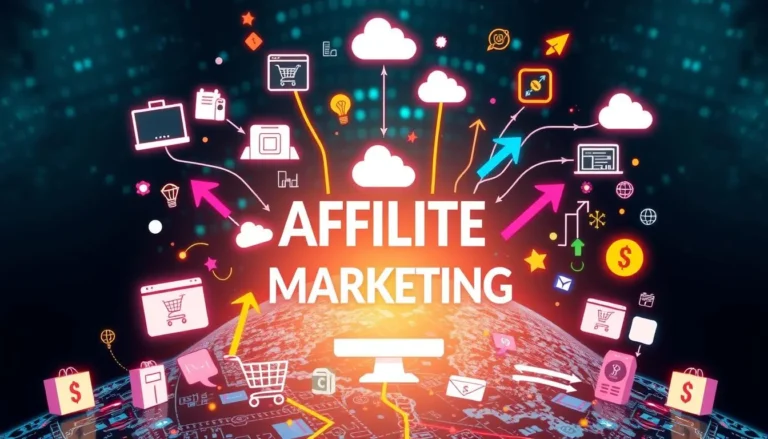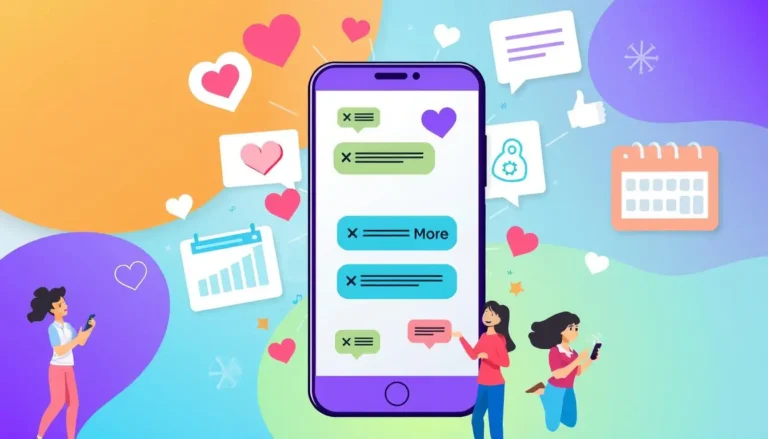The Future of Marketing: How AI is Shaping 2025 Campaigns
The world of marketing is rapidly evolving due to artificial intelligence. By 2025, AI will change how we talk to customers and manage campaigns. It will go beyond what we do now.
You’re at the start of a big change in marketing. AI is becoming a real tool for businesses. It helps them make campaigns that are more focused, personal, and effective.
AI is making it easier for marketers to understand what customers want. It uses advanced tools like predictive analytics and smart content creation. These tools are changing how we talk to customers and how they see brands.
Key Takeaways
- AI is transforming marketing strategies with advanced data analysis
- Personalization and customer targeting reach new levels of precision
- Machine learning enables real-time campaign optimization
- Predictive analytics drive more intelligent marketing decisions
- Customer experiences become more intuitive and responsive
Understanding the AI Revolution in Digital Marketing
The realm of digital marketing is rapidly evolving due to AI. Machine learning and new tech are changing how we market. This brings new chances for making decisions based on data.
Marketing pros today see big changes thanks to AI. Old marketing ways are being replaced by smarter, more flexible methods. These use advanced algorithms and deep learning.
Machine Learning vs Traditional Marketing Methods
Old marketing used guesses and broad targets. But machine learning makes marketing personal by looking at detailed data. The main differences are:
- Predictive analytics instead of just reacting
- Deeper customer insights in real time
- Campaigns that change and improve
- Targeting that’s more precise
Key AI Technologies Driving Change
| AI Technology | Marketing Application |
| Natural Language Processing | Sentiment analysis, chatbots, content generation |
| Computer Vision | Visual search, image recognition, personalized recommendations |
| Predictive Analytics | Customer behavior forecasting, churn prediction |
Impact on Marketing Decision Making
AI is changing how we make marketing choices. Machine learning algorithms can handle huge datasets. They find patterns and trends that humans might not see. This leads to smarter, more focused marketing.
“AI turns marketing from speculation into a science based on data” – Marketing Tech Insights
The world of digital marketing keeps growing. AI gives marketers great tools to know, connect with, and turn customers into buyers with great accuracy.
Predictive Analytics and Customer Behavior Forecasting
Modern marketers are changing their game with predictive analytics. They turn raw data into tools that forecast customer behavior. AI insights assist companies in predicting customer desires even before they make a request.
Predictive analytics uses smart algorithms to dig through huge amounts of data. It finds patterns and trends that were hidden before. By looking at past customer actions, companies can make marketing plans that really work.
“Data resembles oil, and predictive analytics acts as the refinery that converts it into usable insights.” – Marketing Technology Specialist
- Identify what customers might want before they ask for it
- Save money by focusing on the right customers
- Make customers happier with ads that fit their interests
- Spot when customers might leave and keep them
AI insights do more than just predict trends. They create detailed customer profiles. This lets marketers make ads that speak directly to each person.
| Predictive Analytics Capability | Business Impact |
| Customer Segmentation | 90% better at finding the right customers |
| Purchase Probability Prediction | 35% more sales |
| Churn Risk Assessment | 25% less customers leaving |
By 2025, knowing what customers will do next will be key for marketers. Using predictive analytics, companies can stay on top of trends. They’ll offer amazing value to their customers.
Personalization at Scale: The New Marketing Paradigm
The realm of digital marketing is rapidly evolving, powered by artificial intelligence. Now, personalization at scale is key for brands to reach customers in new ways.
AI is changing how companies talk to customers. With smart algorithms, businesses can make experiences that really speak to each person.
Dynamic Content Optimization
Dynamic content optimization lets marketers make experiences that change as you go. Your messages can:
- Change based on how you act
- Offer products that fit you best
- Update visuals right away
Real-time Customer Journey Mapping
AI has made customer journey mapping better. Brands can now follow how customers move through their journey with great detail.
| AI Mapping Capability | Customer Experience Impact |
| Predictive Path Analysis | 98% Increased Engagement Accuracy |
| Behavioral Segmentation | 75% More Targeted Interactions |
| Real-time Personalization | 82% Higher Conversion Rates |
Automated Campaign Adjustments
AI lets marketers tweak campaigns fast. Automated optimization means your marketing gets better all by itself.
“Personalization is not just a fad—it’s the future of connecting with customers.” – Marketing Insights Report, 2024
Using AI for personalization can lead to deeper connections with your audience. It can also help your business grow a lot.
AI-Powered Content Creation and Distribution
The field of digital marketing is quickly transforming because of AI. It makes creating content much faster and more efficient.Currently, marketers are able to create excellent content rapidly.
AI is also changing how we share content with our audience. It uses data to make content that speaks directly to different groups of people. This makes our messages more personal and effective.
“AI is not taking over human creativity; rather, it enhances our capacity to engage with audiences more efficiently.” – Marketing Technology Expert
- Generates multiple content variations rapidly
- Personalizes messaging for targeted audiences
- Reduces manual content creation time
- Provides data-driven content recommendations
AI content creation has many benefits:
| Feature | Benefit |
| Natural Language Processing | Creates human-like written content |
| Machine Learning Algorithms | Continuously improves content quality |
| Real-time Content Optimization | Adapts messaging based on audience engagement |
Marketers can now use AI to share content on many platforms. This ensures we reach more people and get better engagement. The future of marketing lies in embracing these intelligent technologies that transform how we create and share content.
The Evolution of Marketing Automation Platforms
Marketing automation is changing how businesses talk to customers. Artificial intelligence is making big changes in digital marketing strategies.
AI-powered marketing tools are getting smarter. They give businesses tools to make talking to customers easier and more personal.
Integration of Natural Language Processing
Natural language processing has changed marketing automation. It makes communication systems smarter. Now, these platforms can:
- Understand complex customer queries
- Generate contextually relevant responses
- Analyze sentiment in customer interactions
- Adapt communication styles dynamically
Advanced Segmentation Capabilities
Modern marketing tools use AI for better customer segments. They look at many data points to:
- Identify micro-segments based on behavioral patterns
- Predict customer preferences with high accuracy
- Customize marketing approaches for specific audience groups
Cross-channel Campaign Management
AI helps manage campaigns across different platforms. Marketers can now send messages at the right time and place.
| Feature | Traditional Approach | AI-Powered Approach |
| Customer Segmentation | Basic demographic grouping | Complex behavioral analysis |
| Message Personalization | Generic templates | Dynamically generated content |
| Channel Coordination | Manual management | Automated synchronization |
“The upcoming trends in marketing focus on developing personalized experiences rather than simply broadcasting messages.” – Marketing AI Specialist
By using these new marketing tools, businesses can make customer interactions better. They become more engaging, responsive, and effective.
Voice Search and Conversational Marketing
The digital marketing world is changing fast with voice search and conversational marketing. AI assistants are making it easier for brands to talk to customers in a more natural way. This makes communication more intuitive and personal.
Voice search is a big deal for marketers now. More people use smart devices to look up things, buy stuff, and talk to brands. This means marketers need to rethink how they create content and optimize for search engines.
“Voice interactions have lost their novelty and are increasingly becoming the main method of digital communication.”
- AI assistants understand natural language patterns
- Conversational marketing enables real-time customer engagement
- Voice search queries differ from traditional text searches
Businesses need to update their SEO to fit conversational search patterns. They should make content that answers questions, uses everyday language, and gives clear, direct info. In this manner, AI assistants can effortlessly share it with users..
Here are some key ways to improve voice search:
- Make FAQ-style content
- Use conversational keywords
- Use structured data markup
- Focus on local search intent
The marketing world’s future is all about smart communication tech. By getting into voice search and conversational marketing, brands can build stronger bonds with their audience.
Data Privacy and Ethical AI in Marketing
The digital marketing world is changing fast. It brings big challenges in data privacy and using AI right. Marketers must find a balance between new ways to connect with customers and keeping their data safe.
AI is changing how companies talk to customers. But with this power comes big ethical duties. It’s key to understand data privacy and use AI in a way that’s clear and fair to keep customer trust.
Compliance Frameworks for Responsible AI
Creating strong compliance frameworks is vital for using AI ethically. Important steps include:
- Setting strict rules for collecting data
- Establishing clear methods for customers to consent to data usage.
- Creating open policies on how data is used
- Doing regular checks on AI systems
Transparent AI Decision Making
AI transparency means showing how decisions are made. Customers should know why they see certain ads. This builds trust and shows you care about using AI the right way.
“Trust is the foundation of any successful customer relationship” – Marketing Ethics Expert
Building Customer Trust Through Responsible Practices
To build trust in AI marketing, focus on:
- Telling customers clearly how their data is used
- Protecting their data well
- Letting customers choose not to be tracked
- Showing you follow ethical AI rules
By putting data privacy and ethical AI first, marketers can make stronger, more respectful bonds with customers in our digital age.
Marketing ROI Optimization Through AI Analytics
AI analytics is transforming our perception of marketing effectiveness. Now, you can measure and boost your marketing ROI with advanced AI. It digs deep into your campaign data.
AI analytics platforms are changing how we track marketing. They use smart algorithms to give deep insights into how well campaigns work across different channels.
“AI goes beyond data analysis—it forecasts future success with impressive precision.” – Marketing Technology Insights
- Real-time performance tracking
- Predictive budget allocation
- Advanced attribution modeling
- Automated optimization recommendations
AI analytics makes it easier to make smart marketing choices. Your campaigns can get better and better, thanks to smart insights. This implies you maximize the benefits of your investment.
AI analytics for marketing ROI brings many benefits:
- Precise audience segmentation
- Intelligent budget distribution
- Predictive campaign performance forecasting
- Enhanced customer journey mapping
By using AI-driven marketing analytics, you can turn data into smart strategies. The future of marketing optimization is here. Are you ready to boost your ROI?
Conclusion
The future of AI marketing is changing how businesses talk to customers in 2025. You’ll observe the convergence of technology and creativity. Marketing pros need to quickly learn to use new AI tools for better insights and personalization.
Your success depends on balancing tech innovation with real customer experiences. AI helps marketers make smarter, data-based choices. The marketing trends of 2025 show that those who use AI and keep a human touch will win in the digital world.
To get ready for this change, keep learning and be flexible. You’ll need skills like strategic thinking, creative problem-solving, and making ethical choices. The best marketers will use AI insights to connect with customers in meaningful ways.
Remember, AI is meant to boost your marketing, not replace your instincts. Stay updated, adapt, and focus on what customers want. This way, you can thrive in the world of AI marketing ahead.
FAQ
How is AI changing marketing strategies in 2025?
AI is transforming marketing by making it more personalized and effective. It uses advanced algorithms to understand and predict what customers want. This way, marketers can create campaigns that change and adapt to each user’s preferences.
Which essential AI technologies are affecting digital marketing?
Key AI technologies in digital marketing include machine learning and natural language processing. These help businesses understand their customers better. They also improve how content is distributed and marketing strategies are made.
Is AI-generated content reliable for marketing?
AI-generated content is getting better but it’s best when humans review it. AI can create quality content, but humans are needed to keep the brand’s voice and emotions right.
How does AI improve customer personalization?
AI makes personalization possible by analyzing lots of customer data. This lets marketers offer content and products that fit each customer’s unique needs and history.
What are the privacy concerns with AI marketing?
Privacy is a big issue in AI marketing. Companies must be open about how they use data and follow laws like GDPR. They should also get clear consent from customers and use data responsibly.
Can small businesses leverage AI marketing technologies?
Yes, AI marketing tools are getting easier and cheaper for small businesses. Cloud-based platforms and scalable solutions help them use AI without big costs. This includes tools like chatbots and automated email marketing.
How is voice search impacting marketing strategies?
Voice search is changing marketing by making content more conversational. Marketers need to write for how people talk and use long-tail keywords. They also need to make sure their websites work well with voice-activated devices.
What skills do marketers need to succeed with AI?
Marketers need to know about data, AI, and strategy. They also need to be able to understand and use AI insights. Staying updated on AI developments is crucial for achievement.
How does AI improve marketing ROI?
AI helps marketing ROI by giving better analytics and tracking. It helps allocate budgets better and predict campaign success. This way, marketers can make decisions based on data and see the impact of their work.
What are the limitations of AI in marketing?
AI has limits like bias and not fully understanding emotions. It’s also risky to rely too much on data. Successful AI marketing balances tech with human touch and empathy.







